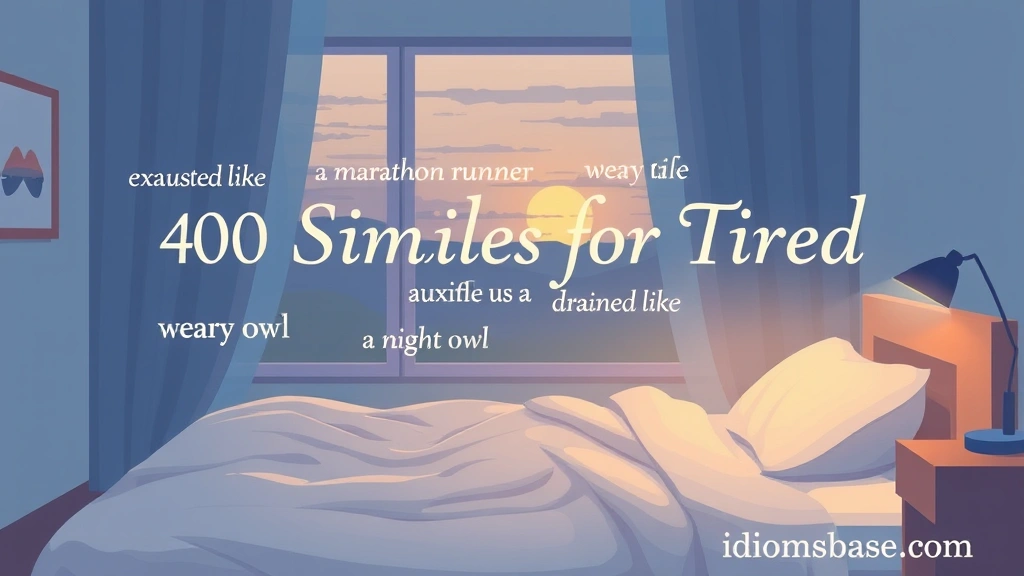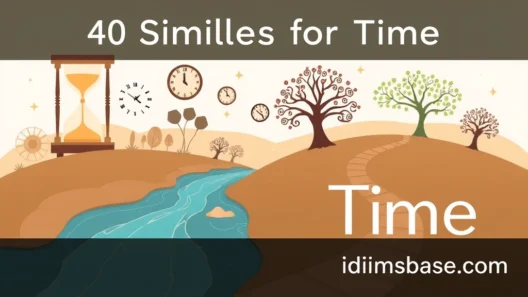Ever felt so utterly exhausted that words just escape you? You’re not alone! We've all been there, dragging ourselves through the day, feeling like we're running on fumes. But how do you truly convey that bone-deep weariness to someone else? Saying "I'm tired" just doesn't quite cut it, does it?
Sometimes, you need a little more pizzazz, a dash of descriptive magic, or a sprinkle of poetic flair to capture the true essence of your fatigue. That's where similes come in! Similes are like secret weapons for writers and speakers, allowing you to paint vivid pictures with words by comparing one thing to another using "like" or "as." They help your audience feel what you're feeling. And when it comes to being tired, oh, there's a whole rainbow of ways to describe it!
Get ready to discover 40 fantastic similes that will help you articulate exactly how tired you are, whether you're feeling a little sleepy or completely wiped out. Let's dive in!
40 Similes for Tired
When you're trying to express just how weary you are, these comparisons can add a powerful punch to your words. From the mildly lethargic to the utterly drained, we've got you covered!
- As tired as a dog after a long chase: Perfect for that feeling after a busy day, when you just want to flop down.
- Like a deflated balloon: When all your energy has gone out of you.
- As worn out as an old shoe: You've been on your feet all day, and you feel every step.
- Like a rag doll: Limp, floppy, and completely lacking in stiffness or energy.
- As heavy as lead: Your limbs feel weighted down, making every movement an effort.
- Like a zombie: Moving slowly, perhaps a bit dazed, and definitely not fully awake.
- As sleepy as a sloth: Slow-moving, deliberate, and dreaming of a nap.
- Like a wet noodle: No strength, no firmness, just utterly limp.
- As drained as a battery: Your energy levels are at zero, completely depleted.
- Like a wilted flower: Drooping, lacking vibrancy, and in need of revival.
- As tired as a cat in the sun: Blissfully sleepy, wanting nothing more than to bask and doze.
- Like a slug: Moving at a snail's pace, leaving a trail of exhaustion.
- As dead as a doornail: Utterly lifeless and unresponsive due to extreme tiredness.
- Like a broken toy: Unable to function properly, parts of you feel out of sync.
- As heavy as a sack of potatoes: Your body feels cumbersome and difficult to move.
- Like a ghost: Pale, perhaps a bit transparent, and feeling somewhat detached.
- As tired as a worn-out dishrag: Squeezed dry of all energy and completely limp.
- Like a melting candle: Slowly losing form and substance, just fading away.
- As flat as a pancake: All your bounce and energy have disappeared.
- Like a log: Sleeping deeply, unmoving, and completely out.
- As tired as a clock without springs: No inner drive or mechanism to keep going.
- Like a ship without a sail: Drifting aimlessly, lacking direction and power.
- As heavy as concrete: Your eyelids, your head, your whole body feels incredibly weighted.
- Like a zombie in a horror movie: Mindless, shuffling, and just trying to get through.
- As tired as a clock at midnight: Reached the end of its cycle, ready for rest.
- Like a sponge that's been wrung out: Every last drop of energy has been squeezed from you.
- As tired as a squirrel after gathering nuts for winter: Exhausted from intense, sustained effort.
- Like a sleepy bear in hibernation: Ready to crawl into a cave and not wake up for months.
- As tired as a book read too many times: Worn, frayed, and needing to be put to rest.
- Like a car running on empty: sputtering, struggling, and about to stop.
- As tired as a forgotten dream: Fading away, hard to grasp, and slipping into oblivion.
- Like a marionette with tangled strings: Awkward, uncoordinated, and unable to move smoothly.
- As tired as a phone on 1% battery: Critically low on power, about to shut down.
- Like a deflated football: No bounce, no energy, just lying there.
- As tired as a houseplant needing water: Drooping, thirsty for rest and rejuvenation.
- Like a broken record: Repeating the same slow, tired movements or thoughts.
- As tired as an old, dusty attic: Full of accumulated weariness, neglected and still.
- Like a cloud dissipating: Slowly fading, losing form and substance.
- As tired as a shadow at noon: Short, barely there, and ready to disappear.
- Like a ghost in the morning light: Fading away as the new day begins, needing to retreat.
Why Are Similes So Effective?
Similes aren't just fancy words; they're powerful tools that enhance communication and understanding. Here's why they work so well:

- Vivid Imagery: They create strong mental pictures, helping your audience visualize what you're describing. "As tired as a wet noodle" immediately brings to mind a limp, floppy image.
- Relatability: By comparing something abstract (like tiredness) to something concrete and familiar (like a deflated balloon), similes make your feelings more understandable and relatable. Everyone knows what a deflated balloon looks like!
- Emotional Connection: They can evoke a stronger emotional response than a simple statement. "I'm tired" is factual, but "I'm as tired as a zombie" adds a touch of humor and despair that resonates.
- Engagement: Similes make your language more interesting and engaging. They break up monotonous speech or writing, keeping your audience hooked.
- Conciseness: Sometimes, a well-chosen simile can convey a complex feeling more efficiently than a long explanation.
Using Similes in Your Everyday Life
You don't need to be a poet to use similes effectively! They can spice up your daily conversations, emails, and even professional presentations.
- In Conversation: Instead of "I'm so sleepy," try "I'm as sleepy as a sloth today." It's more memorable and often gets a chuckle.
- In Writing: Whether you're crafting a creative story, a blog post, or just an email to a friend, similes can add depth and personality.
- For Humor: Many similes, especially those describing extreme tiredness, can be used for comedic effect.
- To Emphasize a Point: When you really want someone to understand the depth of your exhaustion, a strong simile can drive the point home.

FAQ: All Your Tiredness Simile Questions Answered!
You've got questions, and we've got answers! Let's explore some common queries about similes and expressing fatigue.
Q1: What is the main difference between a simile and a metaphor?
A simile directly compares two different things using "like" or "as." For example, "He eats like a pig." A metaphor, on the other hand, states that one thing is another, implying a direct equivalence without using "like" or "as." For instance, "He is a pig" (implying he eats like one). Think of similes as saying something is similar to something else, while metaphors say something is something else.
Q2: Can I create my own similes for tired?
Absolutely! The best similes often come from your own observations and experiences. Think about what exhaustion feels like to you. Does it feel heavy? Light? Limp? What everyday objects or animals share those characteristics? For example, if you feel sluggish and slow, you might say, "I'm as tired as molasses in January." Be creative!

Q3: Are there any similes for tired that are too informal for professional settings?
Yes, some similes are definitely more casual than others. While "as tired as a dog" is generally acceptable, "like a zombie in a horror movie" might be too informal for a formal business report. When in doubt, err on the side of caution and choose a more universally understood and less whimsical simile. Stick to comparisons that are broadly relatable and not overly quirky.
Q4: How can I make my similes more impactful?
To make your similes more impactful, choose comparisons that are:
- Unexpected but logical: A fresh comparison can grab attention.
- Visually strong: The image should be clear and vivid in the reader's mind.
- Emotionally resonant: It should evoke the feeling you're trying to convey.
Also, consider your audience. A simile that works for a group of friends might not land as well in a different setting.
Q5: Why is it important to have diverse ways to describe being tired?
Having a wide range of ways to describe tiredness allows for greater precision and expression. Not all "tired" feelings are the same! Sometimes you're just sleepy, other times you're utterly spent. Different similes help you distinguish between these nuances. It also keeps your language fresh and engaging, preventing repetition and boredom for your audience. It shows your command of language and adds richness to your communication.
Key Takeaways
- Similes are powerful literary devices that compare two different things using "like" or "as."
- They create vivid imagery, enhance relatability, and make your language more engaging.
- Describing tiredness with similes helps convey the nuance and intensity of your fatigue.
- From "as tired as a dog" to "like a deflated balloon," there are countless ways to express exhaustion.
- Don't be afraid to create your own similes to add a personal touch to your descriptions.
- Choose your similes carefully, especially in formal settings, to ensure they are appropriate and impactful.
So, the next time you're utterly worn out, don't just say "I'm tired." Reach for one of these fantastic similes and truly capture the essence of your weariness! Which one will you use first? Let us know!






